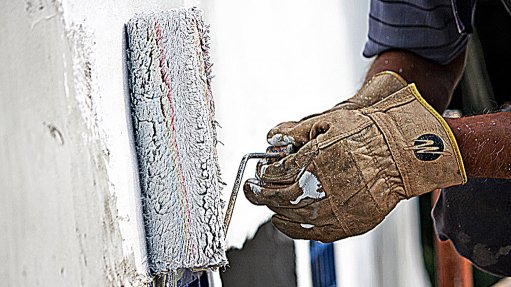
PAINTING A DIFFERENT PICTURE Government is well aware of the high volumes of consumer complaints about the lack of skills shown by paint contractors
Painting contractors in the construction industry could soon require their painters to be accredited, in an effort to decrease poor workmanship of work done on government projects, the South African Paint Manufacturers Association (Sapma) notes.
Paint contractors who continue to employ untrained applicators, producing substandard work, should take note that government regu-lations calling for certificates of compliance, issued by a coatings industry controlling body, could be imminent, says Sapma executive direc-tor Deryck Spence.
“There is a wake-up call coming for these contractors,” he says, adding that government is increasingly favouring the concept of certificates of compliance.
“The plumbing industry, for example, recently voluntarily introduced rulings to the effect that once a plumbing job has been completed by a registered Plumbing Industry Registration Board (PIRB) plumber, a PIRB Plumbing Certificate of Compliance for such a project is issued,” says Spence.
As part of the process of obtaining this certificate of compliance, the work is vetted through an external third-party auditing process. “I strongly believe that the paint contracting industry should consider introducing a similar control system – or face being forced to do so if they want to handle governmental projects,” he states.
Spence recently attended a governmental workshop, where it was strongly hinted that, when governmental Strategic Integrated Projects (Sips) were put out to tender, all contractors or subcontractors involved would have to provide evidence of training and skills of workers before their tenders would even be considered.
“The situation could easily be remedied if paint contractors sent their staff for training at Sapma’s Coatings Industry Centre of Excellence, where, after training, the painters receive accreditation in the form of a Sapma Certificate of Competence,” he says.
“It is likely that government will, in future, insist that Sip contracts be awarded only to painters who hold such accreditation. Govern-ment is well aware of the high volumes of consumer complaints in media columns and on websites about the lack of skills shown by paint contractors.
“Building contractors, consultants and speci-fiers, therefore should know that their choice of paint subcontractor for building projects might soon be determined by proven skills levels,” adds Spence.
Sapma’s intensive applicator training offered at the Centre of Excellence consists of six five-day modules. On completion of the first five modules, a Sapma Certificate of Competence is awarded and a Chemical Industry Education and Training Authority CEO Statement of Results is issued. After completing the sixth and final module, the learner will receive a Sapma Skills Qualification for Basic Coatings applicator certificate.